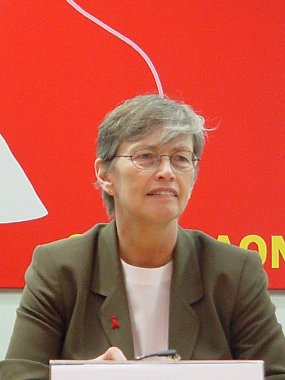
The holistic, 'rights-based' approach to children's health that Carol Bellamy brought to the agency earned her many critics
After 10 years at the helm, a controversial new UNICEF
The holistic, 'rights-based' approach to children's health that Carol Bellamy brought to the agency earned her many critics.
By Michael J. Jordan
UNITED NATIONS, N.Y. When Carol Bellamy toured the globe as head of UNICEF, she would wield the 1989 Convention on the Rights of the Child. As the world's leading advocate for children, Ms. Bellamy demanded from the 192 signatories of the convention the right for children to grow up "in health, dignity, and peace"; free of conflict, HIV/AIDS, and poverty; and protected from violence, exploitation, and abuse.
Her approach highlighted a new holistic focus on children's health that she brought to the agency during 10 years at the helm. Originally, UNICEF was geared just toward child survival; now, immunization and nutrition are but one facet of its game plan. Women's rights, including broadening reproductive options, have become part of the organization's purpose.
"The rights-based approach means we expect [countries] to meet their obligations, not to ask them to be charitable toward children," Bellamy told the Monitor this week, the last one in her tenure after serving the maximum of two five-year terms at the 59-year-old organization.
As Bellamy moves on, observers note her success in helping reduce child-mortality rates and opening access to education, especially for girls. But the shift in focus has earned the departing UNICEF chief her share of critics: from medical professionals who charge that UNICEF has "lost its way" to religious conservatives who brand Bellamy as a "radical feminist" with a pro-abortion agenda. It's even likely that the next chief, a former member of President Bush's cabinet, will return UNICEF to its more traditional roots.
Bellamy's approach jibes with contemporary international-development theory, advanced by the UN and others, which suggests that providing women and girls with access to better healthcare and education may drive economies toward prosperity.
"There's no way children will survive and thrive if their mothers are not healthy and literate," says Charles MacCormack, president of Save the Children, an international health group. "Carol was a pioneer in drawing attention to this very crucial reality."
Bellamy, a Clinton appointee and former New York politician, Wall Street lawyer and banker, and director of the Peace Corps, will be replaced by Ann Veneman, secretary of Agriculture during Mr. Bush's first term. (Washington, as the single-largest donor to UNICEF, enjoys the right to nominate an American to lead the agency.)
At a press conference in February, Ms. Veneman was asked if she would continue to emphasize primary and secondary education for girls. "I don't come with any broad agenda with regard to those or any other social issue," she said. "I don't believe these issues are relevant to the mission of UNICEF."
This stance is likely to please Bellamy critics who assert that while children's rights are important, her advocacy has detracted from its core function.
"The problem over the last 10 years is that UNICEF has not provided sufficient leadership in child survival, with the consequence that there is insufficient advocacy and support for implementing the proven, low-cost interventions that can save more than 10 million children from dying each year," says Robert Black, chairman of international health at the Johns Hopkins Bloomberg School of Public Health in Baltimore, Md. "There is still the need to do the conceptual and programmatic work to support countries with high child mortality. This is an important responsibility of UNICEF that I hope will be taken more seriously in the future."
Dr. Black's research found that interventions could save the estimated 10 million children and concluded that six countries - India, Nigeria, China, Pakistan, Congo, and Ethiopia - accounted for the deaths of half the world's children under age 5.
Among Bellamy's more vociferous critics has been The Lancet, a British medical journal. In an editorial published last December, editor Richard Horton suggested that UNICEF's "preoccupation with rights" kept most children in the 42 countries that account for 90 percent of deaths of children under 5 from receiving needed care. "Child survival must sit at the core of UNICEF's advocacy and country work," he wrote. "Currently, and shamefully, it does not."
Bellamy's staff responds with statistics of its own: a 16 percent drop in child mortality worldwide since 1990, with progress everywhere except in AIDS-plagued sub-Saharan Africa; a 99 percent reduction in polio since 1988; a 40 percent reduction in measles since 1999; more children in school than ever before; and "the enactment of national laws and policies in dozens of countries to better protect and service children."
Bellamy defenders suggest the preoccupation with results for children under 5 ignores those ages 6 through 18, or the inequity between boys and girls around the world. "Whenever a family is short on resources, they invest in their sons," says Adrienne Germain, president of the International Women's Health Coalition.
Bellamy has also angered groups like the Catholic Family and Human Rights Institute by advocating access to abortion and "sexual health." For example, UNICEF material teaches the health and economic benefits of "birth spacing" - for women not to have more than one child every two years. And UNICEF and other UN agencies have also made available the "morning-after pill" to refugee women who are victims of rape.
Asked to explain the vitriol she has stirred up in her 10 years, Bellamy, who will soon become president of World Learning, a nonprofit group, wheels in her chair, pauses, and gazes out the window at midtown Manhattan from her perch on the 13th-floor of the UN building. "If I understood it, I would tell you," she says. "Women are scary sometimes - sometimes more scary than men."
www.csmonitor.com | Copyright © 2005 The Christian Science Monitor. All rights reserved.









